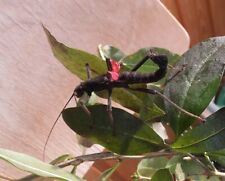
Understanding the Black Insect Bite: A Comprehensive Guide
Have you ever experienced a black insect bite? If so, you’re not alone. Black insect bites can be quite common, especially during the warmer months when insects are most active. In this article, we will delve into the details of black insect bites, including their causes, symptoms, treatment, and prevention methods. By the end, you’ll have a better understanding of what to do if you find yourself with a black insect bite.
What is a Black Insect Bite?

A black insect bite refers to the mark left behind by an insect that has bitten you. The term “black” is often used to describe the color of the bite mark, which can range from a dark red or purple to a blackish hue. Common insects that cause black insect bites include mosquitoes, ticks, bed bugs, and fleas.
Causes of Black Insect Bites

Black insect bites are caused by various insects that feed on the blood of humans and animals. Here are some of the most common culprits:
| Insect | Common Habitat | Typical Bite Appearance |
|---|---|---|
| Mosquitoes | Moist, warm environments | Small, red or purple bump with a central white dot |
| Ticks | Grass, brush, and wooded areas | Large, engorged bite mark that may look like a bruise |
| Bed Bugs | Bedding, furniture, and cracks in walls | Small, red or purple bite marks in clusters |
| Fleas | Pets, carpets, and furniture | Small, red or purple bite marks that may cause itching and scratching |
Symptoms of Black Insect Bites

The symptoms of a black insect bite can vary depending on the type of insect and your body’s reaction. Common symptoms include:
-
Redness and swelling around the bite area
-
Pain or itching
-
A small, raised bump or blister
-
In some cases, a large, engorged bite mark that may look like a bruise
In some cases, black insect bites can lead to more severe symptoms, such as an allergic reaction or infection. If you experience symptoms like difficulty breathing, swelling of the throat, or a high fever, seek medical attention immediately.
Treatment for Black Insect Bites
Most black insect bites can be treated at home with simple measures. Here are some tips for treating a black insect bite:
-
Clean the bite area with soap and water to prevent infection
-
Apply a cold compress to reduce swelling and pain
-
Take an over-the-counter antihistamine to relieve itching and swelling
-
Apply a hydrocortisone cream to reduce itching and inflammation
If you have a severe allergic reaction or infection, you may need to seek medical attention. Your doctor may prescribe medication to treat the infection or provide other treatments as needed.
Preventing Black Insect Bites
Preventing black insect bites is the best way to avoid the discomfort and potential complications that can arise from these bites. Here are some tips for preventing black insect bites:
-
Wear long sleeves and pants when outdoors, especially in areas with high insect activity
-
Use insect repellent containing DEET, picaridin, or oil of lemon eucalyptus
-
Check your clothing and body for ticks after spending time in wooded or grassy areas
-
Keep your home and yard free of standing water, which can attract mosquitoes
-
Regularly inspect






